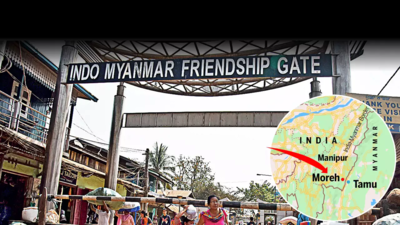- News
- India News
- Govt to spend Rs 31,000 crore to fence 1,643 km India-Myanmar border
Trending
Govt to spend Rs 31,000 crore to fence 1,643 km India-Myanmar border
The Indian government has sanctioned a Rs 31,000 crore project to fence the entire 1,643 km India-Myanmar border to address smuggling issues. This measure impacts Manipur, Mizoram, Nagaland, and Arunachal Pradesh. Union Home Minister Amit Shah stated that 30 km of fencing is done. The Free Movement Regime has been terminated.

NEW DELHI: The Indian government on Wednesday approved a plan to fence the entire 1,643 km India-Myanmar border, which is known for the smuggling of arms, ammunition, and narcotics.
The project is estimated to cost Rs 31,000 crore, according to news agency PTI. The border passes through the states of Manipur, Mizoram, Nagaland, and Arunachal Pradesh.
Earlier on Tuesday, Union home minister Amit Shah said that 30 km of the border has already been fenced, which he identified as the root cause of the ethnic violence in Manipur.
Shah has been regularly monitoring the security situation in Manipur and ensuring necessary actions are taken, PTI reported. Two battalions of the Central Reserve Police Force (CRPF) have been deployed in Manipur, along with around 200 companies of central police forces
The Indian government has also scrapped the India-Myanmar Free Movement Regime (FMR), which allowed people living close to the border to travel up to 16 km into each other's territory without any documents. The regime was implemented in 2018 as part of India's Act East policy.
The Manipur government has also started using 25 mobile vans as shops to provide essential commodities at fair prices to the general public, operating in all districts of the state.
Additionally, Kendriya Police Kalyan Bhandars (KPKB, police canteens) have been opened to provide essential commodities to the people of Manipur at fair prices. Sixteen new stores are being opened, with eight in the valley districts and eight in the hilly areas, in addition to the 21 existing police canteens.
The ethnic violence in Manipur began on May 3 last year after a tribal solidarity march in the hill districts protested against the majority Meitei community's demand for Scheduled Tribe status.
Since then, over 220 people from both the Kuki and Meitei communities, as well as security personnel, have been killed in the ongoing violence.
The project is estimated to cost Rs 31,000 crore, according to news agency PTI. The border passes through the states of Manipur, Mizoram, Nagaland, and Arunachal Pradesh.
Earlier on Tuesday, Union home minister Amit Shah said that 30 km of the border has already been fenced, which he identified as the root cause of the ethnic violence in Manipur.

Shah has been regularly monitoring the security situation in Manipur and ensuring necessary actions are taken, PTI reported. Two battalions of the Central Reserve Police Force (CRPF) have been deployed in Manipur, along with around 200 companies of central police forces
The Cabinet Committee on Security has given in-principle approval for the construction of border fencing and roads along the India-Myanmar border. Fencing work has been completed for 10 km near Moreh, and another 21 km is currently underway in other areas of Manipur.
The Indian government has also scrapped the India-Myanmar Free Movement Regime (FMR), which allowed people living close to the border to travel up to 16 km into each other's territory without any documents. The regime was implemented in 2018 as part of India's Act East policy.
The Manipur government has also started using 25 mobile vans as shops to provide essential commodities at fair prices to the general public, operating in all districts of the state.
Additionally, Kendriya Police Kalyan Bhandars (KPKB, police canteens) have been opened to provide essential commodities to the people of Manipur at fair prices. Sixteen new stores are being opened, with eight in the valley districts and eight in the hilly areas, in addition to the 21 existing police canteens.
The ethnic violence in Manipur began on May 3 last year after a tribal solidarity march in the hill districts protested against the majority Meitei community's demand for Scheduled Tribe status.
Since then, over 220 people from both the Kuki and Meitei communities, as well as security personnel, have been killed in the ongoing violence.
End of Article
FOLLOW US ON SOCIAL MEDIA











